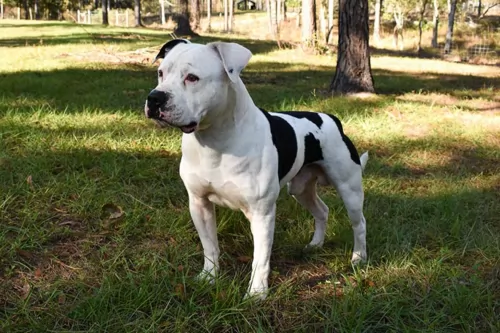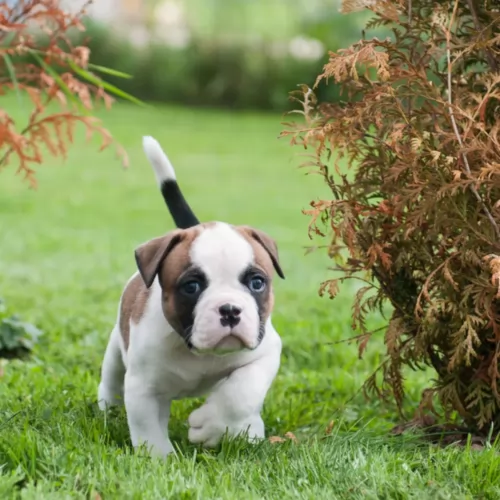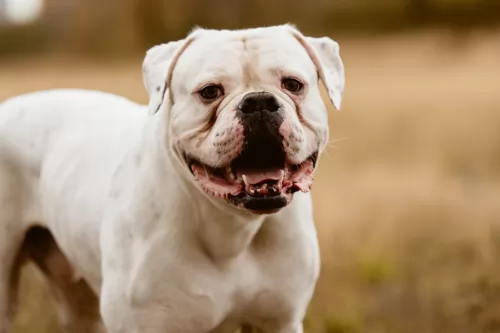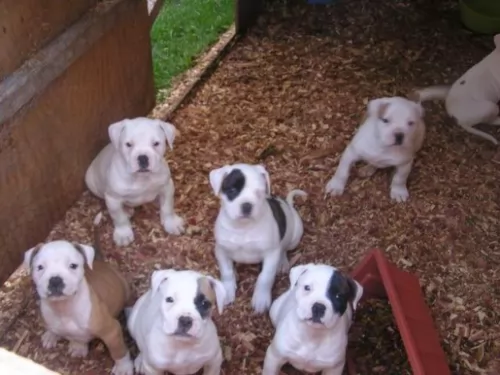 Petzlover
Petzlover Both American Bulldog and American Pit Bull Terrier are originated from United States. American Bulldog may grow 14 cm / 6 inches higher than American Pit Bull Terrier. American Bulldog may weigh 24 kg / 53 pounds more than American Pit Bull Terrier. Both American Bulldog and American Pit Bull Terrier has almost same life span. Both American Bulldog and American Pit Bull Terrier has almost same litter size. Both American Bulldog and American Pit Bull Terrier requires Low Maintenance.
Both American Bulldog and American Pit Bull Terrier are originated from United States. American Bulldog may grow 14 cm / 6 inches higher than American Pit Bull Terrier. American Bulldog may weigh 24 kg / 53 pounds more than American Pit Bull Terrier. Both American Bulldog and American Pit Bull Terrier has almost same life span. Both American Bulldog and American Pit Bull Terrier has almost same litter size. Both American Bulldog and American Pit Bull Terrier requires Low Maintenance.
 Following World War II, the American Bulldog was almost extinct.
Following World War II, the American Bulldog was almost extinct.
Thanks to John D. Johnson from Summerville, Georgia the breed is still with us today. He gathered the best dogs he could find throughout the rural South and bred them back into popularity among his family and other rural families. His father bred the American Bulldog before John did and they have bred them longer than any other in any part of the world. His dogs were regularly used for tracking, hunting, guarding, watchdog and weight pulling. At some point Alan Scott joined Johnson breeding other bulldogs to Johnson's and forming the Standard American Bulldog.
The American Bulldog/ is popular today as a family pet and companion as well as a working dog.
 The history of the American Pit Bull Terrier might be a confusing one to some dog lovers and certainly to the general public that tends to lump all the “bully” breeds into a category called “pit bull”. This is because of the negative reputation this group of breeds has acquired over the past 30-50 years due to misuse and mis-breeding by the dog fighting industry. This categorization includes the American Pit Bull Terrier, The American Staffordshire Terrier, the Bull Terrier and the Staffordshire Bull Terrier.
The history of the American Pit Bull Terrier might be a confusing one to some dog lovers and certainly to the general public that tends to lump all the “bully” breeds into a category called “pit bull”. This is because of the negative reputation this group of breeds has acquired over the past 30-50 years due to misuse and mis-breeding by the dog fighting industry. This categorization includes the American Pit Bull Terrier, The American Staffordshire Terrier, the Bull Terrier and the Staffordshire Bull Terrier.
There is major confusion and disagreement on the difference between the American Pit Bull Terrier and the American Staffordshire Terrier. The AKC does not recognize the American Pit Bull Terrier as a separate breed, but its founder and the UKC, ADBA do so. In the 1930’s the American Pit Bull Terrier was a recognized breed and in response to the negativity of pit-fighting, they renamed it as the American Staffordshire Terrier.
The American Pit Bull Terrier was developed to be a little larger in size than the Staffordshire in both height and weight. This breed comes from crossing various Bull and Terrier breed to get a working dog. The Amstaff for the most part is bred to be a show dog and is not usually a “street dog” used in dog fighting rings. The direct ancestors of the APBT are the Old English Bulldogs and the Old English Terriers. These dogs are great family dogs, gentle beyond comparison unless raised to fight. They make great therapy dogs as well as police dogs. They are not by nature cruel, aggressive or attack dogs.
Both professional confirmation breeders and street fight breeds have developed new strains of the American Pit Bull Terrier. A few are worth mentioning here.
One of the oldest strains of the American Pit Bull Terrier they are red in color and that red is a very unique tone. They have a copper colored coat and nose with red nails, red lips and amber or red eyes. These dogs were originally from Ireland and when they came to America they had the red nose. Originally bred for gameness, it is the red color that is sought after now.
These are another old breed, but they have black noses and were initially bred by John P. Colby in the late 1800s. These dogs were known to be indominable fighting dogs and were bred into almost every line of American Pit Bull Terriers that exist today. The line is still maintained by the Colby family.
 The American Bulldog is a powerful and muscular dog in a sturdy and compact frame. The female is more refined than the heavy boned and stocky male, but both genders are athletic, agile and quick. The have large heads, strong jaws, a muscular neck and with a moderately deep and wide chest.
The American Bulldog is a powerful and muscular dog in a sturdy and compact frame. The female is more refined than the heavy boned and stocky male, but both genders are athletic, agile and quick. The have large heads, strong jaws, a muscular neck and with a moderately deep and wide chest.
They have a square head, with muscular cheeks and a clearly defined furrow between his eyes. With broad, square and strong muzzles, they have a reverse scissors, scissors, moderate underbite and an even bite. Ears come in a variety of shapes and sizes and eyes can be any color as well. The nose however should be black and lips black as well. Their legs are strong, heavy boned and straight with well-defined muscles in the hindquarters. Finally ,they have a thick, low set tail that comes to a point at the end.
 True to their reputation as fighters, the American Pit Bull Terrier looks like one – powerful, strong and well built. This belies their gentle disposition but too often they are judged by their looks. With a broad, brick shaped head, thick neck and deep chest, they are stocky, muscular and agile. They usually have cropped ears, but the tails are not docked. Their legs are strong and hindquarters especially muscular. These dogs are much stronger than they look. Round soulful eyes are one of the traits that people who keep these dogs as companion animals love about them. They have a scissor bite and one of the strongest jaws of all domesticated canines.
True to their reputation as fighters, the American Pit Bull Terrier looks like one – powerful, strong and well built. This belies their gentle disposition but too often they are judged by their looks. With a broad, brick shaped head, thick neck and deep chest, they are stocky, muscular and agile. They usually have cropped ears, but the tails are not docked. Their legs are strong and hindquarters especially muscular. These dogs are much stronger than they look. Round soulful eyes are one of the traits that people who keep these dogs as companion animals love about them. They have a scissor bite and one of the strongest jaws of all domesticated canines.
 The American Bulldog is characteristically loyal, brave and reliable. It is a friendly, gentle dog that truly loves children. There is not a hostile bone in his body despite his history and reputation for bull baiting. Though he is protective of its family and affectionate with most, he still needs a human companion who is strong willed and a genuine pack leader. Without this he might become aggressive around other dogs and pets. They are immensely self-confident and they do slobber and drool and will become excited and hard to handle without daily exercise of both their body and their minds.
The American Bulldog is characteristically loyal, brave and reliable. It is a friendly, gentle dog that truly loves children. There is not a hostile bone in his body despite his history and reputation for bull baiting. Though he is protective of its family and affectionate with most, he still needs a human companion who is strong willed and a genuine pack leader. Without this he might become aggressive around other dogs and pets. They are immensely self-confident and they do slobber and drool and will become excited and hard to handle without daily exercise of both their body and their minds.
 For those who live with the American Pit Bull Terrier there is no better dog. The APBT loves people and loves children. They think they are lap dogs, and they certainly are watch dogs. They love their people but their barks at strangers at home are not because they are protecting their people but rather they are greeting the strangers into their home. Unfortunately, they will not greet another dog in the same way. However, when their people are seriously threatened they will give their lives to defend them.
For those who live with the American Pit Bull Terrier there is no better dog. The APBT loves people and loves children. They think they are lap dogs, and they certainly are watch dogs. They love their people but their barks at strangers at home are not because they are protecting their people but rather they are greeting the strangers into their home. Unfortunately, they will not greet another dog in the same way. However, when their people are seriously threatened they will give their lives to defend them.
These are strong, confident dogs who want to please their people. They love children and make great family dogs but require a strong owner and a strong pack leader. The need to be under control around other dogs and because of their strength, need a strong owner. It is their aggression towards other animals that must be controlled.
 Though generally healthy, the American Bulldog is prone to a few problems.
Though generally healthy, the American Bulldog is prone to a few problems.
This is a serious issue in many breeds of dogs and is especially prevalent with the American Bull Dog. This may seem ironic in such a short legged dog but it is unfortunately very common. It is a genetic disorder that causes the bones in the joint to separate and causes the dog much pain and lameness.
Due to skin folds you need to be care and watch for irritation and infection in the folds. They are also prone to ear infections.
The American Bulldog is prone to overeating and all the health issues that presents. With short legs and a genetic predisposition to arthritis and hip dysplasia, obesity is a real health risk for your bulldog.
 Though the American Pit Bull Terrier is healthier than most large dogs, they do have an issue with hip dysplasia. Breeders have been working to breed this out of the APBT and their work in this area has helped with the other issues with the patella, heart and thyroid. The APBT can have skin allergies and Demodex Mange. This condition can be either deadly or just a localized skin issue. Immunizations and testing is essential for this breed. When not immunized, American Pit Bull Terrier puppies have a greater incidence of parvovirus than other breeds. They also might have cataracts and congenital heart disease.
Though the American Pit Bull Terrier is healthier than most large dogs, they do have an issue with hip dysplasia. Breeders have been working to breed this out of the APBT and their work in this area has helped with the other issues with the patella, heart and thyroid. The APBT can have skin allergies and Demodex Mange. This condition can be either deadly or just a localized skin issue. Immunizations and testing is essential for this breed. When not immunized, American Pit Bull Terrier puppies have a greater incidence of parvovirus than other breeds. They also might have cataracts and congenital heart disease.
 How you feed your American Pit Bull Terrier puppy is important to her health as an adult and long life. The adult dog should be fed one and a half to two and a half cups of high quality food twice a day. Puppies should be fed more often as they grow. DO not feed your APBT soft or canned dog food. Their food should be dry. Be careful not to feed too much as you do not want an obese American Pit Bull Terrier.
How you feed your American Pit Bull Terrier puppy is important to her health as an adult and long life. The adult dog should be fed one and a half to two and a half cups of high quality food twice a day. Puppies should be fed more often as they grow. DO not feed your APBT soft or canned dog food. Their food should be dry. Be careful not to feed too much as you do not want an obese American Pit Bull Terrier.
As previously mentioned this is a healthy breed with problems with:
These are usually inherited, and the pup may show signs early, or they could be developed later in life. They can be removed.
Hip dysplasia as in many larger, stronger breeds this can be a major problem. Breeds should test for it and APBT breeders are attempting to breed it out of the APBT.
This is a congenital issue that breeders are also breeding against and if they have it your American Bit Bull Terrier was likely born with it.
Many APBT are allergic to grasses or out outside allergens. Shots or medication can deal with these.
This is an athletic, joyful breed that loves to play, love sports and loves any activity that bonds it with its family. Some of the many sports the American Pit Bull Terrier likes to participate in include: agility, obedience competition, weight pulling, lure coursing and fly ball. He also needs backyard exercise and daily walks.
When walking your American Pit Bull Terrier, make sure she is on a leash as the breed has a tendency to be aggressive with other dogs coming into their space. The APBT loves to work. They are good therapy dogs, search and rescue dogs, even service dogs.